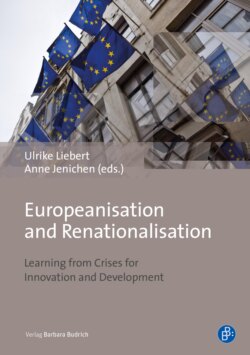Читать книгу Europeanisation and Renationalisation - Группа авторов - Страница 31
На сайте Литреса книга снята с продажи.
7. The migration crisis: a new wave of Euroscepticism?
ОглавлениеShortly after the return of economic stability and strong growth, the CR was faced with another “crisis,” this time of immigration. Its course is particularly interesting in the CR, as the migration wave skipped the country and the number of “new” migrants located in the CR in 2015 and 2016 was only in the dozens; however, “history” repeated itself and Eurosceptic groups as well as coalition parties inveighed against EU immigration policy. As Graph 3 shows, the image of the EU, which began to quickly improve in 2013, reached its peak in 2014 and followed a steep downward course in 2015 correlating with the migration crisis.
The reaction of Czech politicians to the migration crisis was similar to the “debate” on the adoption of the common currency. The clearly oppositional position of the Czech public had a likely effect on the position of the political elite. Just as with the case of the common currency, the degree of consensus [60] among the political elite regarding their opposition to the “German solution” has been remarkable. Parties of the right as well as the left have come out against a quota system on the distribution of refugees. Indeed, party elites have generally called for reinforcing the internal borders of the Schengen area (Idnes.cz 2016). The relative agreement across the political spectrum, irrespective of whether from a traditionally pro-Europe or from a Eurosceptic party, is a key factor here. Even the strongly pro-Europe TOP 09 issued a press release outlining a change in their platform, calling for a de facto cap on immigration. This can be seen in phrases such as “The establishment of more rigorous asylum regulations and their strict maintenance” or “The creation of asylum centres outside of Europe under international protection” (TOP 09 2016). The traditionally pro-Europe Christian Democrats also reacted similarly, speaking of “the rejection of any obligatory distribution quotas, which does not address the situation as such, but merely its effects” (see the KDU-ČSL website). In other words, the admission of refugees is outside politically acceptable boundaries in the CR and rejection of this step forms the basis of discussion, with various levels of severity. Other parties have opposed the allocation quotas as well; ODS and ANO 2011 (as well as the Communists, indirectly, see Týden.cz 2015) have even called for filing a complaint at the European Commission, similarly to what Slovakia and Hungary have done.
Generally speaking, Czech politicians are largely sceptical about taking in refugees, with widely varying degrees of radicalism regarding this “unified” scepticism. Another important aspect of the formation of the parties’ final positions is the fact that these rather sceptical positions regarding migrants were obstructed by their own members. Indeed, this may be why they did not adopt more radical positions: The elites of various parties (particularly TOP 09 and ČSSD) have sometimes been incapable of deciding on even basic positions regarding the crisis, and individual opinions of party elites have ranged from clearly anti-immigrant to enthusiastically pro-immigration (though these are rather unusual). Up to this point, the immigration issue has not become permanently entrenched in the Czech political debate, and instead has manifested itself in waves whenever the CR was forced to take a position on distribution quotas. Lubomír Kopeček (2016b: 3) sees crisis potential lurking behind this relatively quiet situation:
The migrant crisis will continue to have a significant impact on Czech politics and society and may disrupt government unity. The gap between a well-educated urban population advocating for tolerance and the majority of the society that rejects refugees will provide an opportunity for political mobilisation, which could be exploited by President Zeman and others.
The dissatisfaction of the general population may indeed be too tempting for political parties, as it could be converted into votes. Other than small organisations like the Bloc against Islam, SPD (Freedom and Direct Democracy) and [61] The Dawn of Direct Democracy, parties have resisted the temptation to exploit the migration crisis as a wedge issue up to this point, but that could change with the approach of elections to the Chamber of Deputies (which take place in 2017) and the presidential election at the beginning of 2018.
